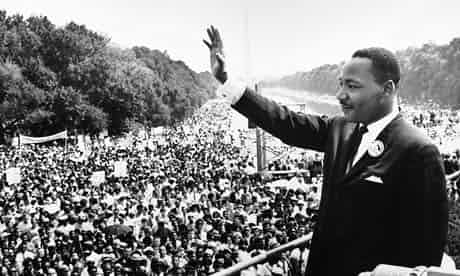The Rev King didn't dream of better people; he dreamed of a better system
Wednesday 28th August 2013,
, Photograph: Hulton-Deutsch Collection/CORB
The rented run-down former church on West 130th Street and Lenox Avenue in Harlem, from which Bayard Rustin organised the 1963 March on Washington, "ran on adrenaline and excitement", says Rachelle Horowitz, who organised the transport for the event.
The heroism of Antoinette Tuff reveals what's missing from politics
Sunday 25th August 2013,
, Photograph: Julio Cortez/AP
In January, when Barack Obama called for the US nation to put pressure on politicians to pass gun control legislation, he warned: "Every day we wait [the number of Americans who die at the end of a gun] will keep growing." Last Tuesday was set to be one of those days. While legislation lay orphaned in Congress, 20-year-old Michael Hill walked into Ronald E McNair Discovery Learning Academy in Decatur, Georgia, with an AK-47-style assault rifle, 500 rounds of ammunition and "nothing to live for".
Bayard Rustin: the gay black pacifist at the heart of the March on Washington
When civil rights leaders met at the Roosevelt Hotel in Harlem in early July 1963 to hammer out the ground rules by which they would work together to organise the March on Washington there was really only one main sticking point: Bayard Rustin.
The Misremembering of ‘I Have a Dream’
Wednesday 14th August 2013,
America cares for you – until you start asking questions
Monday 12th August 2013,
, Photograph: Edward Leavy Jr/Demotix/Corbis
When Ray Kelly, the man Barack Obama is currently considering to lead homeland security, was the New York City police commissioner, he allegedly had a policy of terrorising black and Latino neighbourhoods.
Martin Luther King: the story behind his 'I have a dream' speech
Friday 9th August 2013,
, Photograph: © Bob Adelman/Magnum
The night before the March on Washington, on 28 August 1963, Martin Luther King asked his aides for advice about the next day's speech. "Don't use the lines about 'I have a dream', his adviser Wyatt Walker told him. "It's trite, it's cliche. You've used it too many times already."
Langston Hughes showed me what it meant to be a black writer
Thursday 1st August 2013,
, Photograph by Robert W Kelley/Time & Life Pictures/Getty Images
One of my first columns on these pages didn't make it into the paper. I'd written about the Nato bombing of Bosnia and the comment editor at the time thought I should stick to subjects closer to home. "We have people who can write about Bosnia," he said. "Can you add an ethnic sensibility to this."






